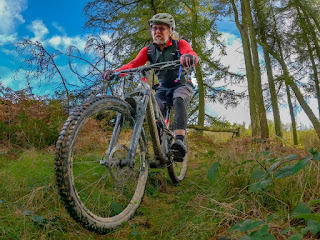Classic Descents In The Cleveland Hills.
This series hopes to show our best-loved tracks on the moors, usually using the GoPro Hero 9 Hypersmooth mode because nobody wants to sit through fifteen minutes of chest cam footage, however magnificent the surroundings. Being someone who is against the whole best of, top ten mentality, especially when applied to unquantifiable entities, they are in no particular order, each one is someone’s favourite.
Episode Two.
Roxby Moor
Like Accelerator at Hamsterley Forest, the Roxby Moor bridleway doesn’t appear to be a descent at all until you realise how fast you are going. Usually when a pedal clips the side of a rut and jettisons the unfortunate rider into the heather. It is not even a classic singletrack but a double track, which opens up some dual slalom possibilities for those so inclined. From Danby Beacon, a broad, stoney track, Lealholm Rigg, heads east, about half a mile down, a bridleway branches off to the left, the track barriered to vehicles by a chain is the Roxby Moor track, although I think it is known as Brown Rigg on Strava but we’ve always called it the Roxby Moor track. The bridleway drops a couple of hundred feet in just over a mile, with a fine view across the heather to Scaling reservoir, glinting like lapis lazuli in the sunshine - if there is any. The downhill ends at a junction of tracks and bridleways, we usually go straight on arriving at the minor road leading to High Tranmire Farm. From here there are numerous options to continue your ride.
About Classic Descents In The Cleveland Hills.
They might not all be in the Cleveland Hills, possibly not even descents and whether they are classics or not is purely subjective but we enjoy them and I’m not one to spoil an alliterative title with facts. The Cleveland Hills form the North West edge of the North York Moors and it is the area where most of our riding takes place, predominantly cross-country; purple moors under big skies, criss-crossed by a network of sandy tracks which link up wholly natural descents, loose and ungroomed, a world away from risk assessments and construction design management. No marker posts or direction arrows, get a map or some local knowledge, “To boldly go...” might not be the wisest course of action, some of these trails change week by week depending on the actions of weather and walkers, you can expect loose rocks to miraculously appear dead in the middle of a moorland singletrack, placed by militant ramblers, who are a little overzealous in their belief the countryside should be closed to any other user groups. Self reliance is your friend, all the usual stuff about bike spares, extra clothing, reserve food, phone battery charged up and generally not being a knob apply, it might be a long way to the nearest road and an even longer way back to your car park. If the worst comes to the worst and the mountain rescue team needs to be called out, a grid reference or What 3 Words phrase will be enormously helpful, if you are unaware of either of these things, should you really be leaving the trail centre? An old-school whistle comes in handy for those spots where phones don’t work. Either three blasts or six blasts with a minute gap between sets is the approved method. Handily most hydration packs have a whistle included in the buckle of the sternum strap. I am not trying to be alarmist here, it’s all just common sense really. The majority of our routes are not gnarly or extreme in any way, we leave that for those more skilled but steep inclines and sudden drops, along with the dreaded ruts will always be possible. https://www.adventuresmart.uk/ Relax, enjoy the scenery, journey not destination and all that, when the heather is in bloom, the sun is shining and the winds are favourable there is no finer place to be.






















































